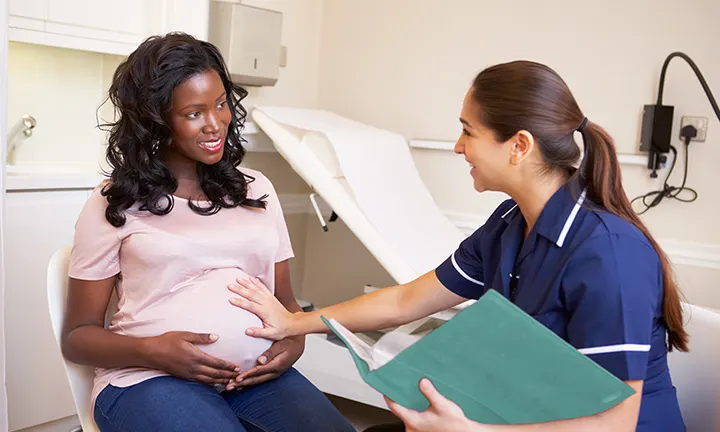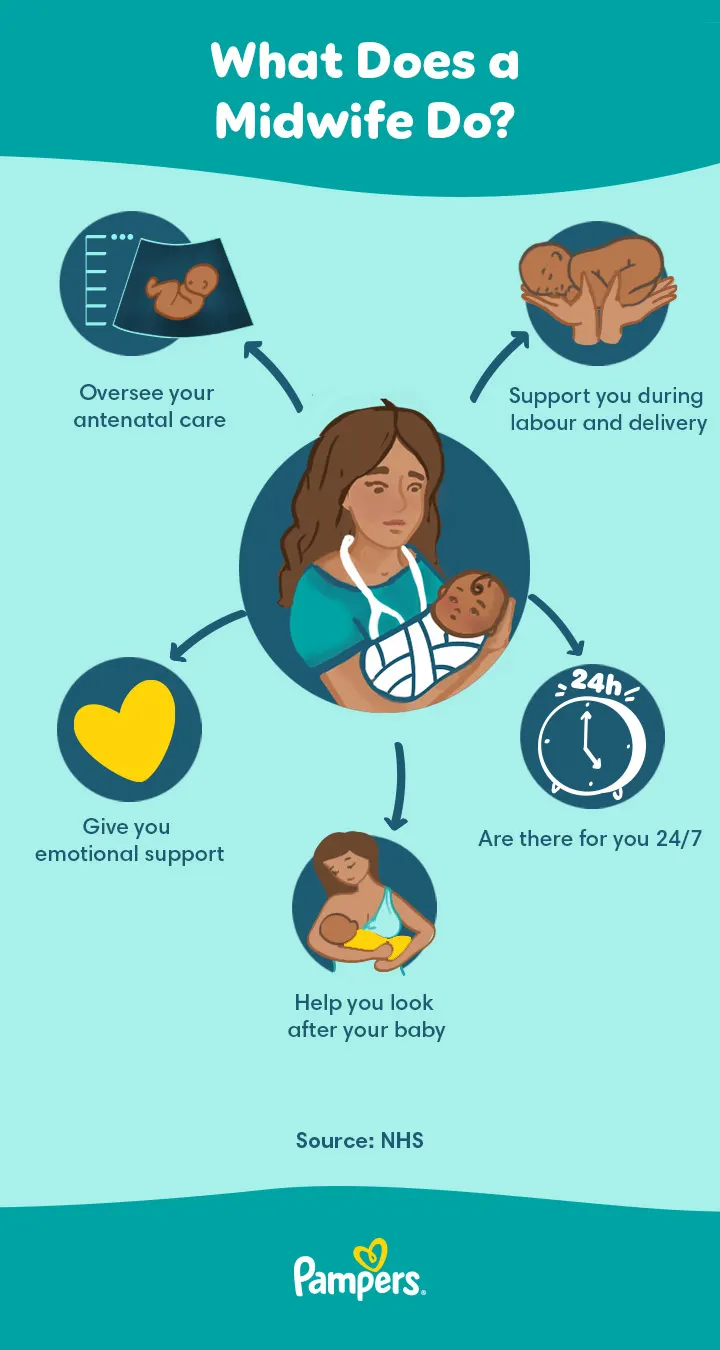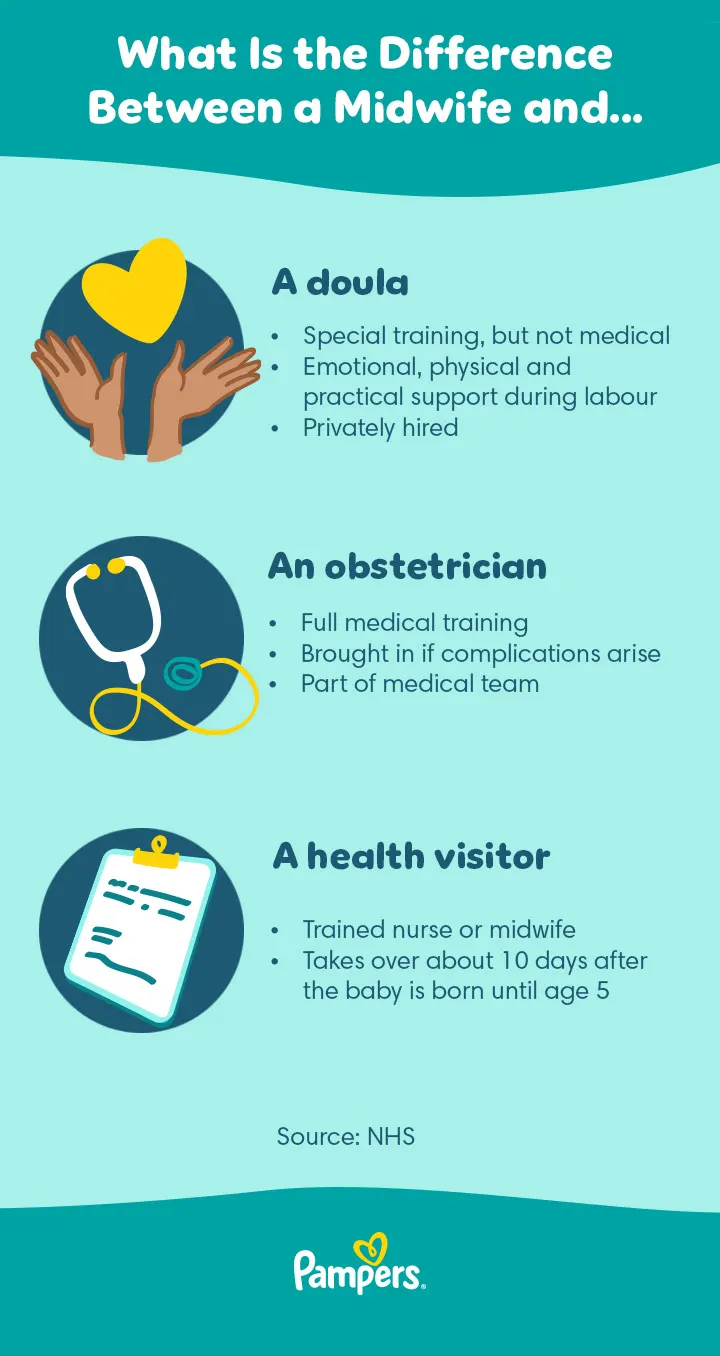What Does a Midwife Do?
Your midwife is there to support you throughout your pregnancy, making sure both you and your baby are safe and healthy from the day you find out you’re pregnant to the first days after your little one is born. A midwife is also there to help you and your family with health counselling, antenatal education, and helping you prepare for parenthood. You’ll find midwives practising in any setting, including the home, the community, hospitals, clinics or other health units. Read on to learn more about the role of a midwife at different stages, the skills needed to be a midwife, and the different types of midwives there are.
What Is a Midwife?
Your midwife is there to provide support during your pregnancy, labour, childbirth, and in those first few days or weeks after your baby is born. The roles, responsibilities and skills needed to be a midwife typically include:
Providing full antenatal care, including parenting classes, clinical examinations and screenings. Your midwife will typically help you plan and schedule all of your tenatal appointments too.
Giving you information about how to maintain a healthy pregnancy (including advice on diet and exercise), how your baby is developing, and what maternity benefits are available to you.
Asking you about any support you may need from other members of the multi-professional team such as obstetricians, health visitors, dieticians and social workers.
Helping identify pregnancies that may pose more of a risk or be more complex e.g. twin pregnancies.
Helping you work on your birth plan, if you’re having one.
Providing you with emotional support and answering many of the questions you have.
Monitoring and supporting you during labour and birth; discussing your options and choices based on what is appropriate and available to you.
Teaching you how to feed, care for and bathe your baby.
Doula vs Midwife
Unlike midwives, doulas are not medically trained, but they have received special training and are an optional addition to your birth team. Their role is primarily supportive, providing emotional and practical assistance during pregnancy, labour and after birth. They may offer services such as antenatal education, hypnobirthing training, and support during labour, but they cannot perform any medical assessments or interventions.
In summary, midwives are healthcare professionals focusing on the medical aspects of childbirth, while doulas provide non-medical support and care.
What Is the Role of a Health Visitor and Birth Partner?
Your health visitor is a qualified nurse or midwife who helps, educates and supports you and your family until your child turns five. You may meet your health visitor before your baby is born, or a few days after birth.
The role of your birth partner is just to be with you and support you through the birth. Your birth partner can be anyone you’re close to and rely on for their moral support, like your partner, your best friend, your mum or your sister.
What Is the Role of a Midwife in Comparison to a Doctor?
If your pregnancy is progressing normally, your midwife can provide all of your antenatal care, and can also be by your side during labour and birth. Midwives are available 24 hours a day, and your midwife has the skills needed to provide you with emotional and psychological support. Should you have any questions or concerns, your midwife can provide reassurance or refer you to the skills and knowledge of other professionals. Because midwives undertake a lot of hands-on practice during their education and gain a lot of experience over the course of their career, they amass a lot of valuable knowledge that makes them experts on childbirth.
A midwife is not a doctor, so there are instances when you may need to see a doctor who specialises in caring for women in maternity, called an obstetrician. For low-risk mothers, midwives will handle most of the care and will usually facilitate the birth if there are no complications. An obstetrician, on the other hand, will undertake around 35% of births, usually for more complex cases, such as a c-section, or if the baby becomes distressed during labour.
An obstetrician will also work alongside the midwife if complications arise before or after the birth of your baby.
The Role of a Midwife in Each Stage
In the journey of becoming a parent, midwives are very important. They help and care for you from the start of your pregnancy until after your baby is born. They are experts in making sure both you and your baby are healthy. So, what do midwives do during three key times: pregnancy, labour and delivery, and after the baby arrives? Read on to understand the many ways midwives help during this special time in life.
During Pregnancy
Here are some things that midwives generally support you with during pregnancy:
Providing information and support. Midwives offer advice on healthy living, pregnancy and preparation for parenthood.
Giving regular health checks. They monitor the health of you and your baby, including checking the baby’s growth and position.
Identifying conditions. Midwives help in identifying any conditions that might require additional care or intervention.
Offering emotional support. They provide emotional and psychological support, understanding the anxieties and concerns that may arise.
Providing antenatal classes. Midwives often lead or arrange antenatal classes to prepare for childbirth and parenting.
During Labour and Delivery
When you go into labour, your midwife or doctor will likely be your first port of call. they will then be there to monitor your labour as it progresses. Here are some of the roles of a midwife during labour and delivery:
Monitoring health. They monitor the health and progress of labour, ensuring the well-being of you and your baby, including frequently listening to your baby’s heartbeat.
Providing guidance. Midwives offer guidance on pain relief and birthing positions.
Assisting in delivery. They assist in the delivery of the baby, ensuring a safe birth.
Providing immediate postnatal care. Midwives provide immediate postnatal care for both you and your newborn.
Manage Emergencies. They are trained to recognise and manage emergencies during labour and childbirth.
After Your Baby is Born
After birth and for about 10 days after, your midwife will provide support for you and your baby and check that you’re both well. In some cases, they may visit you at home or you might go to your local children’s centre. After these initial days, your health visitor will generally take over the care of you and your baby.
Here are some of the things your midwife will do after your baby is born:
Providing postnatal checks. Conducting health checks on you and your baby, including monitoring your baby’s feeding and growth.
Offering breastfeeding support. Providing support and advice on breastfeeding.
Supporting health education. Midwives will work with you to ensure you’re comfortable with day-to-day baby care, including bathing, dressing and handling your baby.
Offering emotional support. Midwives can offer emotional support to new parents, addressing concerns about baby care, recovery and adjusting to parenthood.
Giving referrals if needed. They may refer you to other healthcare professionals if any additional support or treatment is needed.
At What Point Should You Find a Midwife?
It’s best to see a midwife as soon as you find out you’re pregnant. You can either go to your GP, who can put you in touch with a midwife or a midwifery service, or you can book your first appointment with a midwife directly. Your midwife will become your main point of contact when it comes to antenatal care from the first trimester onwards.
Appointments with your midwife may take place at home, at a GP’s surgery, at the hospital or a children’s centre. Tests and scans will usually take place at a hospital.
What Training Does a Midwife Have?
Midwifery is a regulated profession. Midwives must register with the Nursing and Midwifery Council (NMC) and must have an approved NMC midwifery degree. These degrees usually take at least three years to complete, unless the midwife is a qualified nurse, in which case they may do a shortened midwifery programme. Student midwives must spend a minimum of half of the programme in clinical practice, working directly with pregnant people, their families, and newborns in hospitals, at birth centres and at the homes of parents or parents-to-be.
Midwifery programmes prepare students to practise safely and effectively so that by the time they register with the NMC, they can assume full responsibility and accountability for their work as midwives.
The training doesn’t end there: Midwives will continue their professional and personal development throughout their careers, which includes learning and developing new skills and knowledge.
Can Men Be Midwives?
Yes, of course, men can become midwives. Although traditionally midwives were women, today you’ll also find male midwives working in the UK. Whether you have a female or a male midwife, you will get safe and competent care. What’s important is that you have a good relationship with your midwife because you’re putting faith in them at a time when you’re feeling nervous and vulnerable. It’s important that you feel listened to and respected, that your midwife is responsive to your questions and concerns and that they understand the emotional, physical and psychological aspects of your pregnancy.
Are There Different Types of Midwives?
Within the NHS system there are
Hospital midwives who are part of the hospital’s maternity team, caring for you while you’re in hospital, whether this is while you’re pregnant, during labour, when you give birth, or immediately after your baby is born
Community midwives who provide care in GP practices, in your home or at children’s centres. Community midwives are more likely to work with you throughout your pregnancy, from your first appointment until care is taken over by a health visitor.
More and more, midwives work both in the community and in hospitals so parents-to-be have continuity of care. Ask your midwife how they work and whether they will be present at the hospital on the day your little one is born. It may also depend on your hospital’s policies as some hospitals have their own midwives to support you during your time in hospital.
Outside the NHS system, there are independent midwives who typically work with parents-to-be who are planning a home birth.
In some cases, you may prefer or need a specialist midwife who has additional training and experience in areas such as
diabetes
antenatal and newborn screening
twins and multiples
teen pregnancy
infant feeding.
FAQS AT A GLANCE
A midwife is not necessarily a qualified nurse. Midwifery and nursing are separate professions with distinct educational standards. While nurses can undertake a short course midwifery program to practice as a midwife, they cannot provide midwifery care without this additional qualification. Thus, midwives are the only registered professionals specifically trained and qualified to provide midwifery care.
The Bottom Line
Your midwife is an important part of your maternity team, working hard to make sure both you and your baby are healthy. Your midwife is there for you during your pregnancy journey and in that moment when you first meet your little one. Remember to #ThankYouMidwife, whether it’s on the big day, over the course of your pregnancy, or even on the International Day of the Midwife on the 5th of May!
How We Wrote This Article The information in this article is based on the expert advice found in trusted medical and government sources, such as the National Health Service (NHS). You can find a full list of sources used for this article below. The content on this page should not replace professional medical advice. Always consult medical professionals for full diagnosis and treatment.
Join Pampers Club and get:






